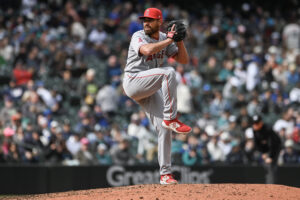The latest episode of the MLB Trade Rumors Podcast is now live on Spotify, Apple Podcasts, and wherever you get your podcasts! Make sure you subscribe as well! You can also use the player at this link to listen, if you don’t use Spotify or Apple for podcasts.
This week, host Darragh McDonald is joined by Anthony Franco of MLB Trade Rumors to discuss…
- The RSN model for MLB clubs (1:00)
- The latest details on the Diamond Sports Group bankruptcy (4:05)
- The Astros signed Josh Hader (12:35)
- The Angels signed Robert Stephenson (19:05)
- The Pirates signed Aroldis Chapman (21:50)
Plus, we answer your questions, including…
- Does J.D. Martinez make sense for the Angels? (24:30)
- With the Mets in rebuild/retooling mode and the Mariners in need of another infield bat (and a surplus of controllable young arms), is there a trade there? (27:55)
- How odd is it that we are this late in January and have several players likely to get multi-year deals? (31:55)
Check out our past episodes!
- The Cubs’ Activity, Marcus Stroman And Jordan Hicks – listen here
- Teoscar Hernández Signs With L.A. And The Move-Making Mariners and Rays – listen here
- Yoshi Yamamoto Fallout, the Chris Sale/Vaughn Grissom Trade and Transaction Roundup – listen here
The podcast intro and outro song “So Long” is provided courtesy of the band Showoff. Check out their Facebook page here!

